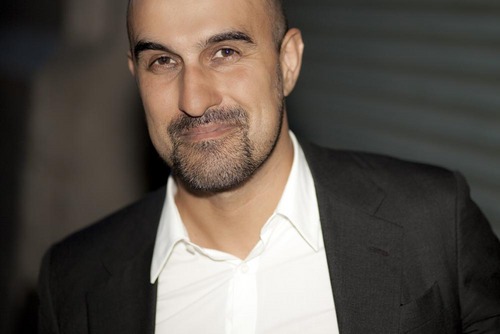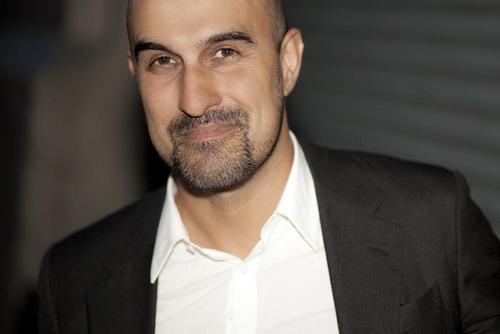Alain de Botton appeared on The Bat Segundo Show #444. He is most recently the author of Religion for Atheists.
Listen: Play in new window | Download
Condition of Mr. Segundo: Seeking pragmatic forms of belief.
Author: Alain de Botton
Subjects Discussed: The difficulties of turning other people onto enthusiastic concepts, why religion draws extremists on all sides of the debate, attempting to fight capitalism through a new belief system, the Agape Restaurant, Susan Cain’s Quiet, including introverts within community-based ideas, the Day of Atonement, mandatory voting in Australia, attempts to reach people who are not inclined to forgive, voluntary mediators, a temple for atheism, the need to feel small, feeling small through extra human forces, the power of awe, aesthetic uses of science, being awed by the city and knowledge, the mass appeal of Proust and Tarkovsky, South Park, competing notions of awe and boredom applied to the same idea, religion as a populist medium, the upside of vulgarity, high and low culture, Tarkovsky as a joke high culture figure, superbia, egotistical notions in getting to know someone through prosaic conversational questions, social status as a way of fending off other people, dependence, religious distinction through coherent brand identities, role models, reductionism and marketing, responding to architecture, touching people through their senses, São Paulo’s prohibition of advertising, religion’s reliance upon advertising, making a public claim for certain states of the soul, the Kony 2012 campaign, the pros and cons of shame, how humans can be more interesting than a smartphone, how technology forces humans to relearn essential concepts, and how human life is in permanent competition with superficial biases.
EXCERPT FROM SHOW:
Correspondent: Your books very often have this moment where you describe a very funny yet sometimes socially awkward encounter where you attempt to impart some concept or some amazing idea in your head that you are excited about and that the person who is receiving this intelligence often expresses some dismay. I think of, for example, your long speech at the Mojave Airport Graveyard in The Pleasures and Sorrows of Work or your attempt to pitch yourself as a writer-in-flight to the British Airways head honcho Willie Walsh. Obviously, I think, based off of this, you are aware that some of your excitement is being misperceived. So in light of trying to consider a scenario along the lines of what you’re preaching in Religion for Atheists — where you’re trying to have certain concepts stick in other people’s heads and religion is more fraught, more sensitive than the norm — how do you get through to these people? I mean, if you’re aware of these things, you’re probably going to have moments even more extreme than the two I’ve cited. So what of this predicament? How do you go ahead and convert these people over to your side?
De Botton: Well, I suppose, when it comes to religion, you’ve got extremists on both sides of the debate. You’ve got religious believers who are very fervent in their belief and think that anything else, anything besides full conversion to their creed is not acceptable. And at the same time, you have very fierce atheists who think that any involvement with religion is evil and to be resisted. And I’ve tried to write a book that’s somewhere in the middle of those two. It’s a book that tries to say that, as an atheist, you can nevertheless engage with aspects of religion. And indeed those aspects may be very enriching for your understanding of secular society. So it’s a weird book. Because it really is fairly in the middle of something that most people would consider to be incompatible, which is atheism and religion. It’s arguing that atheism should engage in, and can engage, with aspects of religion. And it can be shot at from both sides. But I also think there is a silent majority that is actually in sympathy with the approach I’m taking. But that is a silent majority that don’t have the pulpits.
Correspondent: But if the movers and shakers, such as the man at the graveyard, require twenty dollar bills to advance things, I’m wondering how you can instill these ideas into a new belief system if everything is centered around commerce, centered around capitalism, centered around the need to get ahead, centered around some unusual man asking to see the airplanes and so forth. I mean, this, I think, is one of the interesting takeaways I get from your book. So how do you solve this?
De Botton: Well, I think that the proposals that I make are aiming to get secular capitalist people in secular capitalist societies to rethink their positions on things. I’m arguing that there are certain things missing from modern society. Though we’ve been fantastically good at delivering material improvements and supplying material needs in the developed world, there are some other needs, which you might call spiritual — and I use that word without any supernatural implications. But spiritual, psychological needs have been left slightly unattended. I’m thinking here of things like our need for community, our need for moral structure, our need for certain guidance through the challenges of life. These things have not been so well done by the secular world and I’m arguing that one of the ways which we can plug some of the gaps in the secular world is to look back at the lessons of religion. And my book is full of examples, of concepts, of practices, of rituals that one might rescue or at least learn from as atheists in a secular world.
Correspondent: Well, there’s one idea — the Agape Restaurant — where you have different types of people sitting at the same table, sharing their stories and so forth. But I’m wondering what safeguards you have in place for people who are shy or who are introverted. There’s a new book by Susan Cain called Quiet that gets into the amount of social energy one has to exert if one is introverted or even ambiverted. And so this also leads me to ask — well, if I go into a situation and I’m asked to share my most intimate secrets with a stranger, I’m not certain if I would want to do that. Because maybe someone there might want to steal my identity or so forth. We would enter such a social arrangement with understandable suspicion. And if you’re an introvert, you may be very scared or it may actually be a little intimidating to be asked to engage in this extroverted activity. So what of these kinds of problems here? What are your solutions? What are your workarounds?
De Botton: I guess my starting point is that the modern world is not so good at community building. There’s a lot of loneliness. Because much of who we are doesn’t get an expression in social life. And this is surprising. Because with Facebook and other social media, we were supposed to have cracked this. But I think people will still complain that in many areas, we don’t have good communities. And religion’s unparalleled at building communities. Now how do religions build communities? One of the things they do is they gather people around a table every now and then and get them to break bread together and get them to talk. That’s how early Christianity started. It started as a series of meals between the followers of Jesus who remembered his lessons and got together to eat. And, as I say, you find this in all faiths. That somehow the stranger is invited to the table and is welcome to the table and a stranger is turned into a friend. It’s a beautiful idea. A simple idea. And I couldn’t help but contrast this with the modern world, where we’re obsessed with eating. And newspapers and media are full of places to eat. The restaurant world is high on the agenda. But what’s never really spoken of is the meal as a source of a social engagement. As a source of discovery of another person. And that is really what interested me. And so with the example of religion in mind, one of the things I do in my book is to suggest how we might learn from the tradition of communal dining of religions, and precisely set up meals between strangers. Now, of course, some of them may feel uncomfortable. And some people like to eat on their own. So it wouldn’t be for everybody. But I think in many of us, there is a desire to shed the armor which we normally have to wear in daily life and to eat with others and to discuss our shared and common humanity.
Correspondent: But what I’m saying is that the introvert who is very fond of, say, one-on-one exchanges, as opposed to mass group exchanges — I mean, how does such a communal dining experience account for that? They may feel very uncomfortable. There may be a lot of social energy. You’re saying that they should go ahead and answer very deep questions about what they fear. And so how do you account for them?
De Botton: Well, look, it’s not for everyone. As I say, if someone wants a one-on-one meal, if someone’s not interested in community, then it might not be for them.
Correspondent: Well, how do you get them involved in the community? If the ideal here is to get everybody on the same page, how…
De Botton: Well, it doesn’t have to be everybody. But it has to be those among us who hunger for community, as many of us do.
Correspondent: But introverts do hunger for community. They just go about it in a different way.
De Botton: Yeah. Well, I couldn’t speak for them.
Correspondent: Okay. Early in the book, you bring up the Day of Atonement — the moment on the Hebrew calendar where Jews must identify all those who they have hurt or behaved unjustly towards. Now those who are part of the Day of Atonement are inclined to forgive any offenders for annoying them or causing them grief. But it is an undeniable truth that very often when you apologize to someone in the secular world, well, they’re not exactly going to have the same degree of understanding sometimes. In fact, your apology may aggravate the other person further. So I’m wondering. To get something along the lines of a Day of Atonement for a secular or non-religious group, I’m wondering: Does it take a specific secular rite? For example, in Australia, if you go and vote, 95% of the people turn out. Because if you don’t vote, then you’ll actually get fined. So I’m wondering if a Day of Atonement along the lines of what you’re talking about would require something like a government mandate for everybody to apologize to everybody. What of this dilemma?
De Botton: Well, I don’t know. I mean, what strikes me as a secular person is how intelligent religious communities are at realizing that community is a very nice thing in many ways. But it’s also very challenging. And you find, throughout the history of religion, mechanisms to ease social tensions. And it struck me that the Jewish Day of Atonement was particularly clever and insightful in recognizing that what holds communities back is grudges. Things that are undigested in the past. And what it encourages people to do is to both accept that another person may have a grudge to bring up, but also that it behooves you not to drag out that grudge. So there’s a kind of mutual responsibility on both sides not to drag out an argument and to move towards forgiveness. And the underlying assumption is that God is the only perfect being. And anyone else is going to be flawed. And so we have to forgive on the basis of our fragility and flawed natures. And I think that’s a very beautiful idea. Look, the specifics of how an atheist might do this can yet be worked out. But it’s food for thought. I think, for me, what’s interesting here is that the psychological mechanism of forgiveness based on a recognition of imperfection. And this is something that the modern world struggles with.
Correspondent: How do you reach, though, someone who is not inclined to forgive? Or who may not in fact be on the same page? I mean, I’m all for you. I would love to see everybody forgive everybody for their sins or their errors or their sleights or what not. But the fact is that a lot of people are just not going to. So what does it take to really bring people around? Does it take constant promotion of idealism along the lines of what you’re saying or what?
De Botton: Well, in the Jewish Day of Atonement, what gets people motivated is a sense that it is normal both to forgive and to have a grudge that you need to bring up. And I think that too often when people annoy the mood for discussing issues, of discussing grudges, it’s because they feel that they’re not going to get a proper hearing, that it might be embarrassing to do this, and that dialogue with another is impossible. So it’s a kind of pessimistic position. And sometimes we may need a bit of help. We may need a third person.
Correspondent: Mediators.
De Botton: Mediators.
Correspondent: Voluntary mediators.
De Botton: And that, in a sense, was the role that God was playing in the Jewish community at that point. He is a mediator.
Correspondent: Yeah. So in addition to having a temple for atheism, we also need to get a mediator army of volunteers. Would this also help to spread further good will and bonhomie?
De Botton: I think you’re focusing a little bit unfairly on the practical aspects of this. I’m really writing as a psychologist. I’m interested in psychology of religion and the psychology of the dynamics that are being explored. So how exactly this might apply, how a secular person might absorb this into their life is capable of many different interpretations?
Correspondent: But aren’t pragmatics important when considering the psychological possibilities of what human beings are capable of?
De Botton: Sure. Absolutely. Absolutely But we don’t have to decide today.
Correspondent: I’m just picking your brain here.
De Botton: Sure. Of course.
The Bat Segundo Show #444: Alain de Botton (Download MP3)
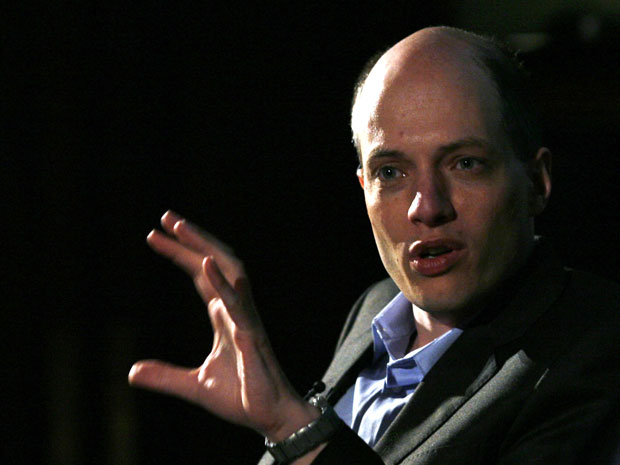

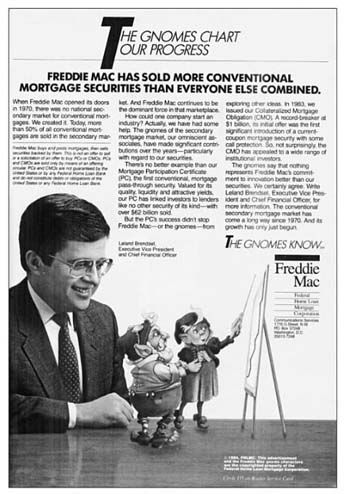 Correspondent: You start this book with a late 19th century image of the fat and prosperous man who sold in cash and the skinny man who sold on credit. I think that more than a century later, it’s safe to say that those roles have now been flip-flopped. You also write, “In the era of the CMO, the smart bank could be like the Skinny Man, its vaults nearly empty, with a pile of IOUs in a nearby basket.” I have to ask you, Louis. You are the debt man. Why were so many people willing to place their faith in the supernatural qualities of the collateralized mortgage obligation? Your book describes a Freddie Mac ad that appeared in a 1984 issue of the American Bankers Association Journal which contained magical gnomes. And they frightened me when I saw that picture.
Correspondent: You start this book with a late 19th century image of the fat and prosperous man who sold in cash and the skinny man who sold on credit. I think that more than a century later, it’s safe to say that those roles have now been flip-flopped. You also write, “In the era of the CMO, the smart bank could be like the Skinny Man, its vaults nearly empty, with a pile of IOUs in a nearby basket.” I have to ask you, Louis. You are the debt man. Why were so many people willing to place their faith in the supernatural qualities of the collateralized mortgage obligation? Your book describes a Freddie Mac ad that appeared in a 1984 issue of the American Bankers Association Journal which contained magical gnomes. And they frightened me when I saw that picture. Hyman: Exactly. So you need to understand that it used to be that it was very difficult to get loans in America of any kind. And that’s why I start the book off with that picture. Because the picture of the Skinny Man, who is nervous and afraid because he had lent on credit to his customers in his store. It was a picture that would be hung in a 19th century store. And the reason I start with that is because I think more than a graph, we are all besieged by numbers these days. More than a graph, it gets at the different mentality, the different practice of lending in the 19th century. That lending was something that was not profitable. It was something that in terms of cash loans wasn’t even legal. And yet today it’s the center of our capitalism. So how did that transformation happen?
Hyman: Exactly. So you need to understand that it used to be that it was very difficult to get loans in America of any kind. And that’s why I start the book off with that picture. Because the picture of the Skinny Man, who is nervous and afraid because he had lent on credit to his customers in his store. It was a picture that would be hung in a 19th century store. And the reason I start with that is because I think more than a graph, we are all besieged by numbers these days. More than a graph, it gets at the different mentality, the different practice of lending in the 19th century. That lending was something that was not profitable. It was something that in terms of cash loans wasn’t even legal. And yet today it’s the center of our capitalism. So how did that transformation happen? 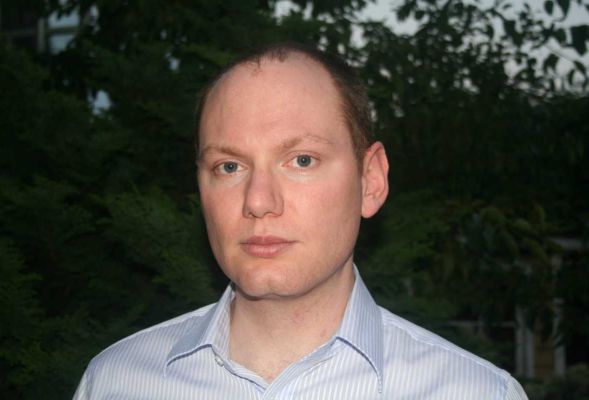 Hyman: People forget. They forgive. And they think that it would be different this time. Because they were tradeable in the secondary market, which the ones in the 1920s were not. They were born toxic almost in the 1920s. But they thought, “Well, these will be fine. They’ll be like FHA loans.” Which had worked for several generations. And actually they worked fine. The securitization worked fine for a long time. From the mid-1970s on for about thirty years. They worked fine.
Hyman: People forget. They forgive. And they think that it would be different this time. Because they were tradeable in the secondary market, which the ones in the 1920s were not. They were born toxic almost in the 1920s. But they thought, “Well, these will be fine. They’ll be like FHA loans.” Which had worked for several generations. And actually they worked fine. The securitization worked fine for a long time. From the mid-1970s on for about thirty years. They worked fine.
